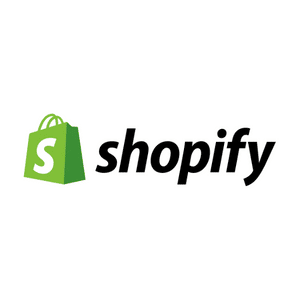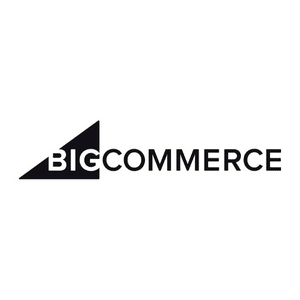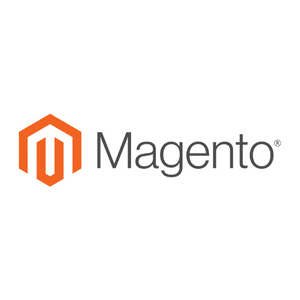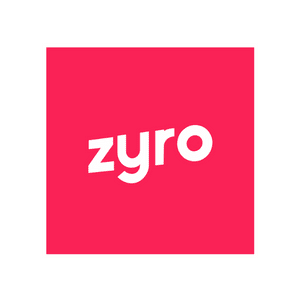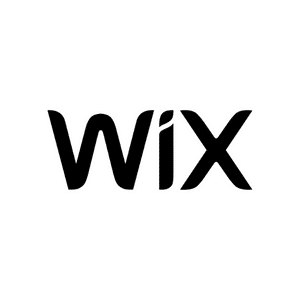Gone are the days of needing a physical storefront for your business to thrive.
Instead, small business owners can develop a booming online store using eCommerce platforms and their wealth of tools!
As a small business expert, I’ve tested the market’s popular eCommerce platforms and narrowed the list down to my 13 favorites.
If you’re looking to take your online business to the next level or start an online store, look no further than here to find the best small business eCommerce platform for you.
What Are The Best eCommerce Platforms in the World?
There are a lot of different aspects to consider when choosing the right eCommerce platform for your online store.
Luckily, this article provides a comprehensive overview of the best tools currently on the market.
For more information on what an eCommerce platform does for your small business, check out my informative section below before you read through the list.
Without further ado, let’s get into it!

Shopify is one of the most accessible eCommerce platforms I’ve ever used, so I chose it to be on this list.
It has fast loading times, affordable pricing, and top-tier eCommerce tools.
Shopify is a dedicated eCommerce platform devoted entirely to helping you build the best online store possible.
It also comes with web hosting and the other necessary technicalities to get your site up and running as efficiently as possible.
Key Features
- On-site blog feature
- Integration with major online marketplaces
- Inventory management
- Intuitive mobile app
- Free trial
- 24/7 email and live chat support
Pricing
Shopify has a variety of payment plans to accommodate nearly any budget.
The Basic plan ($39/month) is an excellent option for business owners looking to start an online store but aren’t as concerned with an actual website. This package allows you to set up listings on social media like Instagram Marketplace.
However, at $105/month, you’ll have access to basic reports, multiple inventory locations, a significant shipping discount, two staff accounts, and an easy-to-use POS system with the Shopify plan.
There is also the Advanced plan at $399/month for users who want to most out of the platform.
Pros
- Easy to use
- Scalability
- No transaction fees with Shopify Payments system
Cons
- Minimal SEO features
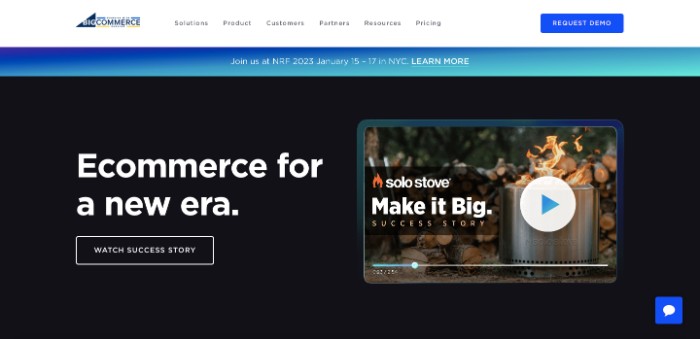
BigCommerce is a majorly popular eCommerce platform, and not without good reason.
They offer great value in their price packages and beautiful mobile-responsive site themes.
Best of all, they’re known for their exceptionally easy-to-use interface that can be a significant bonus for small business owners looking to steer clear of site-building technicalities.
Key Features
- SEO marketing tools
- Dropshipping
- Industry-specific storefront tools and themes
- Free trial
- No transaction fees
- 24/7 support
Pricing
BigCommerce offers three price plans: Standard, Plus, and Pro.
The Standard and plans have everything you need and more for your small business at $29.95/month for no transaction fees, marketplace integrations, unlimited staff accounts, and the capacity to sell up to $50k in merchandise annually.
However, the Plus ($79.95/month) and Pro (299.95/month) are also available if you need more capacity or features.
For users who want a personalized experience, consider the Enterprise plan with customized pricing that fits your business’s budget and needs.
Pros
- Great for beginners
- Sell products across multiple channels from your online storefront
- Excellent search engine optimization
Cons
- Extra cost for more-than-basic online store features

If you have some coding knowledge and are looking for an open-source solution to building your online business, consider Magento.
This popular eCommerce tool by Adobe is a great option for extra flexibility and freedom over your site’s design, functionality, content, and more.
It’s also free of charge to use!
Key Features
- 99.99% uptime
- Endless customizability
- 24/7 customer support
- Huge marketplace for integrations and site extensions
Pricing
Magento is free to use.
Pros
- Free to use!
- Tons of customization options
Cons
- Difficult to use if you don't know how to code
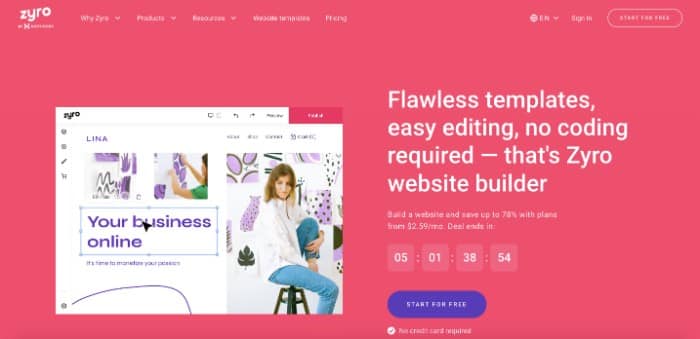
Zyro, a website-building tool by Hostinger, offers regular site-building options and a rich directory of features for building an online store.
It’s now a fully-independent website builder tool that lets you get your small business online stores up and running without coding.
Although you can use their awesome pre-made templates to design your online store, you can also use their drag-and-drop editor to customize your site’s elements.
Key Features
- Fast speeds
- Drag-and-drop editor
- Easy store launch
- Dashboard-based management
- SEO and marketing tools
- Google Analytics reporting
- Intuitive CRM feature
Pricing
Zyro’s Business plan is the most affordable on this list so far, currently on sale at 76% off for $3.59/month and usually priced at $14.99/month with frequent deals.
You can sell up to 500 products using over 20 payment methods for this affordable price.
You also get unlimited site storage and bandwidth, free web hosting, an SSL certificate for security, and a free domain for one year.
Pros
- Excellent value
- Appealing templates
- 24/7 customer support
Cons
- Less customizability than other eCommerce platforms
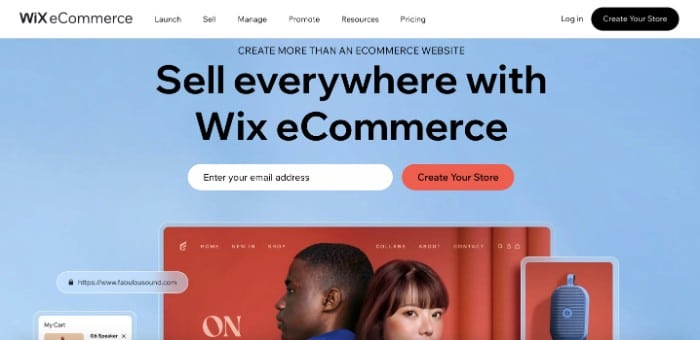
If you’re looking for a tried-and-true website builder with tons of store features, Wix is the best eCommerce platform for you.
Wix offers a variety of features for both tech-savvy and novice small business owners that make it possible to sell online with relative ease.
Wix is a cost-effective solution that allows you to access features and benefits for only a fraction of the price offered by other platforms.
Key Features
- Landing page builder
- Abandoned cart emails for customers
- Built-in SEO tools
- Industry-specific website builders
- High Security
- Custom and a free domain for one year
- 24/7 customer care
- Unlimited products
- Integration with social channels
Pricing
Wix offers three eCommerce plans: Basic ($27/month), Unlimited ($32/month), and VIP ($59/month).
These three plans offer similar features with increased scalability as the price increases.
For example, with the Business Basic plan, you’ll access 50GB of storage, 100GB on the Business Unlimited Plan, and unlimited on the Business VIP plan.
Pros
- Unlimited amount of products you can sell
- Intuitive site builder
- Affordable pricing
Cons
- Limited storage space on basic and unlimited plans
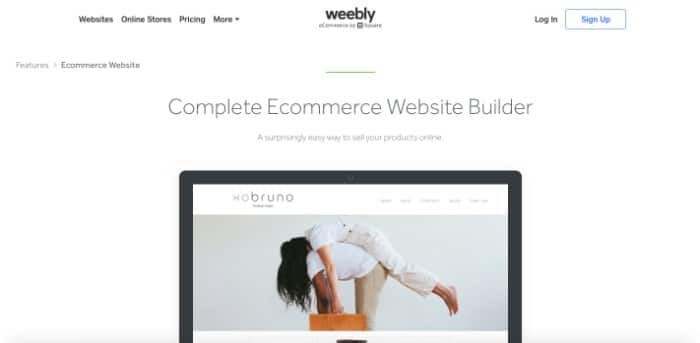
Weebly is an excellent eCommerce platform for small business owners looking for simplicity and ease over hosting high traffic.
Weebly’s eCommerce platform is integrated with Square’s point-of-sale system, offering rock-solid features in terms of online store finances and site-building.
Key Features
- Secure shopping cart
- Inventory tracking
- Great filtered product search for customers
- iPhone and Android apps
- Free hosting
- 24/7 live chat
- SEO tools
- Option to share content as well as products
Pricing
Weebly offers a free plan, especially if your small business runs on a more local scale.
With the Free plan, you’ll have a free SSL certificate to protect your site and all of the basic features you could need for an online store.
If you’d prefer a custom domain, the Personal plan is $10/month.
Or, if you want unlimited storage and extra customization, try the Professional plan ($12/month) or Performance plan ($26/month).
Pros
- Professional store layouts
- Highly customizable
- Affordable
Cons
- Slow loading times
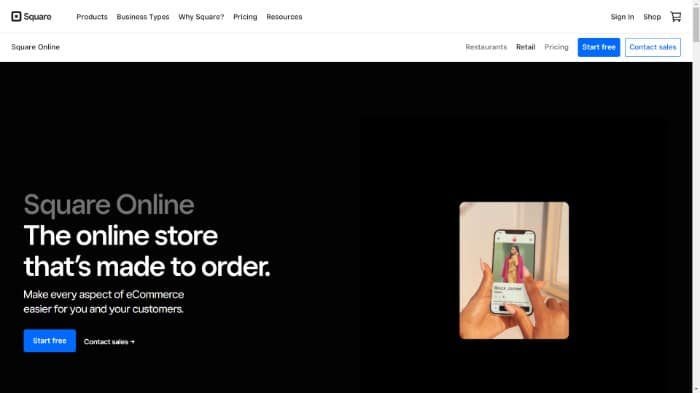
Square Online, otherwise known as Square Online Store, is an innovative eCommerce site-building tool from Square.
If you haven’t heard of them, it’s time to get acquainted! They provide a remarkable payment processing product integrated with many eCommerce platforms.
Their online storefront builder offers a solid free plan and allows you to sell digital and physical products, along with tickets, donations, and services.
It’s connected to their POS system, which includes SEO, lead capture, and social media integration.
The social media integration feature can be compelling for enhancing your e-commerce email marketing strategy.
This is one of the best e-commerce options for those looking for advanced features at an affordable price.
Key Features
- Automatic inventory sync
- Social media integration
- SEO features
- Pickup, shipping, and local delivery
- Industry-specific site builders
Pricing
Square offers a free plan with all the tools in the critical features section.
If you’d like more robust features, sell online with the Plus plan at $29/month.
This plan includes expanded customization, customer accounts, and a free domain for one year.
However, users who want the most out of their e-commerce platform can upgrade to the Premium plan for custom pricing and a personalized experience.
Pros
- Affordable transaction fees
- All-in-one platform for site building and payment
- Free plan
- Super easy to use
Cons
- Limited payment options
- Only available for sales in U.S. and Canada
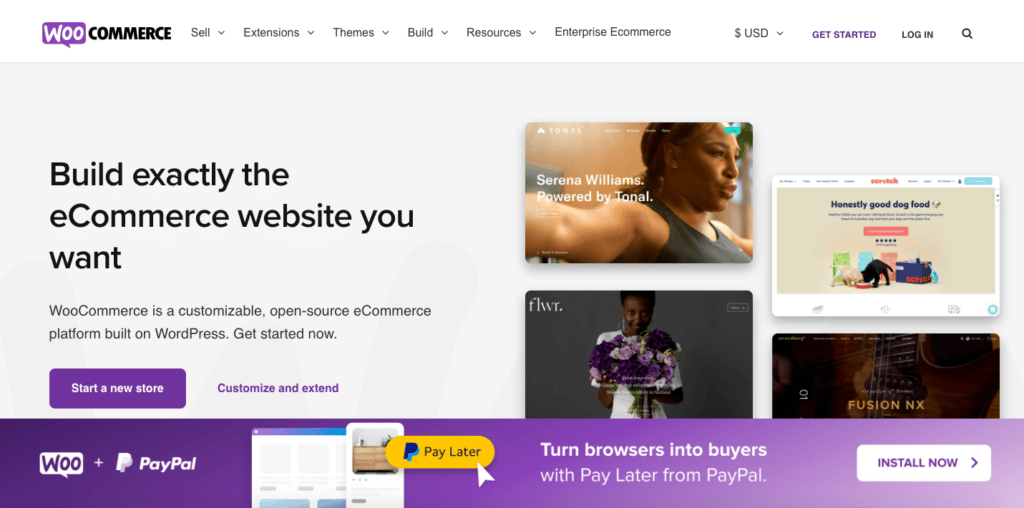
If you currently run a WordPress website, you can quickly transform it into an online storefront with WooCommerce.
WooCommerce is an open-source eCommerce platform, which means it’s free to download and add to your site.
You’ll have to seek your web hosting and domain name.
However, there are a ton of services available. All you have to do is choose a web hosting service that is right for you.
Key Features
- Extreme customizability
- Open-source, so you can code if desired
- Variety of extensions to add to your site
- Built with SEO in mind
- Professional templates
- Secure payments
- High-level analytics
- 30-day money-back guarantee
Pricing
WooCommerce offers a free plan to get started.
However, its eCommerce extensions cost extra.
Pros
- Price flexibility
- Customer support from WordPress experts
- Built-in marketing tools
- High level of theme customizability
Cons
- Extensions necessary for most functions
- Extra hosting purchase required

Squarespace began in 2004 as a CMS (content management system) and website builder, but it’s now added to eCommerce functionalities.
Like some of the other eCommerce platforms on this list, Squarespace offers features like a domain name, web hosting, and an SSL certificate with their plans.
Site designs are easy to build with their drag-and-drop editor.
So easy that you’ll have your site feeling as professional as a brick-and-mortar store in no time.
Key Features
- Free domain, SSL, and web host services
- Integrations with Google Search Console and Google Analytics
- Option to sell digital and personalized products
- No extra transaction fees on the Commerce Basic plan
- One of the best eCommerce website builders available
Pricing
Squarespace eCommerce offers four pricing plans to users: the Personal plan ($23/month), Business plan ($33/month), Commerce Basic plan ($36/month), and Commerce Advanced ($65/month).
The main difference between these plans is that the Personal plan includes a 3% transaction fee, while the other plans have a 0% transaction fee.
Each comes with a mobile-optimized site, advanced analytics, and all the essential features.
Pros
- Super easy to use
- Beautiful themes
- Great value for pricing
- Reliable customer support
Cons
- Limited payment options
- Slower loading times than other eCommerce platforms
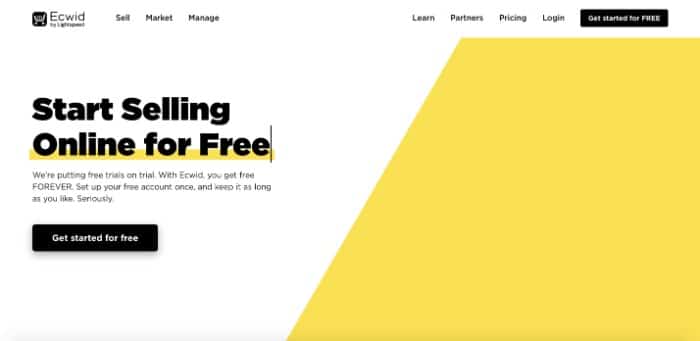
Ecwid is a robust cloud-based eCommerce platform.
Cloud-based eCommerce platforms provide single-site hosting, so they often come with fast loading times and high uptime.
Their free plan is great for small businesses offering only a few products.
If that’s not the case, they offer advanced scalability, making them one of the top eCommerce platforms for small businesses.
Key Features
- Easily integrate existing sites with Ecwid to make them an online store
- Centralized dashboard
- Solid eCommerce management
- Store management apps for iOS and Android
- Social media integration
- One-page checkout and helpful product filtering
Pricing
Ecwid’s pricing starts with a free plan.
Consider their Venture plan at $19/month if you need more features.
This plan is excellent for small businesses because it’s affordable but offers an extensive range of features.
Some of these include the capacity to sell up to 100 products, access to their app market, a customizable checkout, and more.
However, users can upgrade to the Business plan ($39/month) or the Unlimited plan ($99/month) to access more of the platform’s features.
Pros
- Great free plan
- Unlimited bandwidth on all plans
- Integration with existing sites
Cons
- Only 10 products on the free plan

Shift4Shop is a reliable and comprehensive eCommerce platform with features to help customers build an effective online store.
Shift4Shop is the perfect eCommerce platform for small businesses because of its wide range of features, affordable pricing plans, and freedom from technical fuss.
Through Shift4Shop, you can quickly build your brand without breaking the bank or getting overwhelmed with complicated details.
Key Features
- Over 100 design templates
- Intuitive interface
- Easy design bar on site builder
- Essential SEO tools
- Social media integration
- Abandoned cart emails
Pricing
Shift4Shop offers free eCommerce hosting for online stores that make over $500/month.
Otherwise, their plan is a flat $29/mo.
Pros
- Great security and fraud protection
- Flexible and scalable pricing
- Impressive templates
- Fast loading times
Cons
- Limited plugins
- No annual discounts
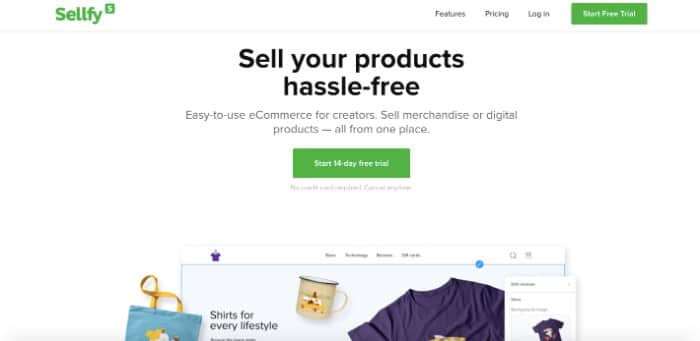
Sellfy is an efficient and affordable eCommerce platform with excellent site metrics and appealing layouts.
It’s an excellent option for small businesses that need simplicity and efficiency rather than high-level design and insane features.
It’s especially great for site owners looking to sell a combination of digital and physical materials.
Key Features
- Domain support
- Hosting included
- High-level security
- Language localizer allows you to sell in many currencies
- Plentiful marketing tools
- 14-day free trial
Pricing
Sellfy’s price plans range from $19-$99 per month, with billing every two years.
The Starter and Business plan are best for small businesses, offering up to $50k in sales each year along with Sellfy’s key features.
This is one of the best-value eCommerce platforms out there.
Pros
- Fast store launch
- Mobile-app management
- Easy to use
- Advanced features for affordable price
Cons
- Plans require upgrade if you reach a certain amount of sales
- No free plan
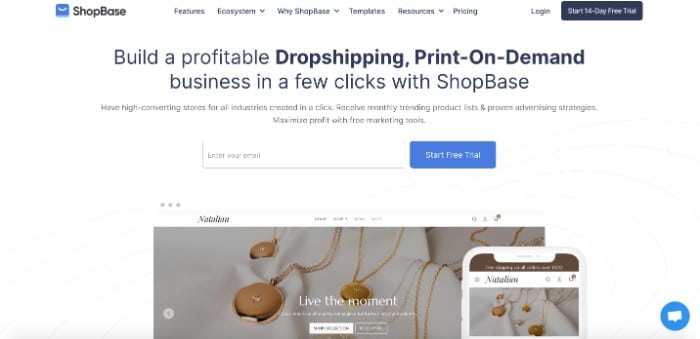
If you’re looking to start a white-label, dropshipping, or print-on-demand (POD) business, ShopBase is your ideal platform.
It provides an effortless website builder and powerful conversion optimization tools to help your online venture succeed.
With ShopBase’s comprehensive functionality and world-class customer service team at your disposal, increasing your online store’s traffic should be a breeze.
Key Features
- SEO tools built-in
- Trending product sourcing
- Flexible payment methods
- Print merchandise on-demand
- Automated store builder
- Unlimited items
- Unlimited sales
Pricing
You can achieve everything you need for more small businesses with ShopBase’s Basic Base plan at $19/month.
This plan comes with ShopBase’s robust, vital features, staff accounts, dropshipping, abandoned cart recovery, and SSL.
However, users can choose from the Standard Base ($59/month) and Pro Base ($249/month).
Pros
- 14-day free trial
- Great security
- Massive value in basic price plan
Cons
- Slow loading speed
- Slight learning curve
What is an eCommerce Platform?
An eCommerce platform allows you to purchase and sell goods over the Internet.
Any online store you’ve seen will likely run with an eCommerce platform.
eCommerce platforms combine website hosting and website building to allow you to create a successful online store seamlessly.
They also allow sellers a single platform to manage virtual assets, digital sales, and marketing activities all in one place, not just product sales.
Often, eCommerce platforms have CRM (Customer Relationship Management) systems built in to help the process of running an online store flow even more smoothly.
eCommerce platforms meet the current day demands of customers.
Whether your business is big or small, sells physical goods or services remotely, B2B or B2C, these eCommerce platforms help companies meet their customers in the ideal environment to boost profits.
Today’s modern consumers are more likely than ever before to prefer web-based shopping and connection.
How to Choose the Best Small Business eCommerce Platform?
Choosing the best eCommerce Platform for you can be daunting, especially with so many options.
Here are some of the main factors you should consider when looking for the right eCommerce tool to help your products or services sold online.
Platform Price
While spending money to make money is sometimes necessary, you shouldn’t have to pay all of your money on your eCommerce platform.
I made sure to include primarily affordable eCommerce plans in this list.
This is because I understand the tight budgets that can come with small businesses.
The good news is you can still get a wide range of features without spending thousands per year.
Available Themes (Design)
Review the available themes and designs of all the eCommerce platforms you’re considering.
Additionally, find a design that matches your business’s branding and sense of style.
Furthermore, you want your website to be easy to navigate for your customers so that they have a pleasant user experience.
Payment Options
The more payment options your online store offers, the more potential sales you’ll have.
This is why it’s essential to shoot for a platform with multiple payment methods, such as Apple Pay and PayPal.
Customer Support
By offering effective eCommerce customer service, online stores provide more than just assistance to their customers.
They’re also creating a smooth and consistent shopping experience across all channels.
From guiding them during the purchase process to resolving any associated issues, these services can help businesses establish meaningful relationships with their customers.
Rock-solid customer support can quickly turn a site visitor or one-time buyer into a loyal customer.
Integrations
eCommerce integration ensures the smooth operation of all aspects of your company by connecting all of your channels.
These can include social media, payment processing, and more.
These integrations can also have analytics tools, which can help you get enhanced information about your sales.
This information is helpful to incorporate into marketing strategy, as you can better understand what’s working for your company and what isn’t.
Your primary services for your online store encompass a range of tools.
These include point-of-sale (POS) systems, marketing tools, an inventory management database, and any applications that assist in interfacing with logistic firms and delivery providers.
Modern eCommerce businesses require at least those and potentially more programs and utilities.
The more you can centralize these different programs to one platform, the easier it will be to run your small business online.
Security Features
Enhancing your security is crucial for maintaining your site’s uptime and protecting your business from eCommerce fraud.
Enhancing security and making that clear on your site makes your customers more likely to trust you!
Consumers are assured that their sensitive data is safe and secure when they purchase from your brand, as you are taking the necessary precautions to protect them.
Additionally, security protocols guarantee customers’ privacy and confidentiality.
Most eCommerce platforms for small businesses offer SSL encryption, a tenet of site security.
Speed
For any eCommerce business to prosper, website speed is integral.
It enhances your conversion rate, promotes repeat transactions, and boosts your rankings on search engines.
With Google Search’s recent changes in their ranking system, a fast loading time is essential in SEO for gaining an edge over competitors.
Plus, most web users need to learn to sit there waiting for a page to load, and after 20 seconds, they’ll probably click out.
Online Store Wrap Up
I hope you discovered some new insights about eCommerce from this overview of my favorites to bring into the New Year.
Starting an online storefront is an exciting venture, and it can be made highly efficient, easy, and even fun with an eCommerce platform.
Good luck on your small business journey!
FAQs about topic
Shopify is the most-used eCommerce platform, but there are other great options depending on your needs.
My personal favorites on this list are Zyro and Weebly.
Shopify is probably the easiest-to-use eCommerce platform I’ve come across. No wonder it’s so popular!
SquareSpace is a great option because it offers product selling with 0% transaction fees.
Shopify is well-regarded for a reason. However, if you’re looking for less-expensive plans, try Zyro or Weebly.
Shopify is the most popular eCommerce website I’ve come across in my small business tool experience.
Newsletter Signup
Join The Leads Field Guide Newsletter for tips, strategies and (free) resources for growing your leads, and closing more deals.

